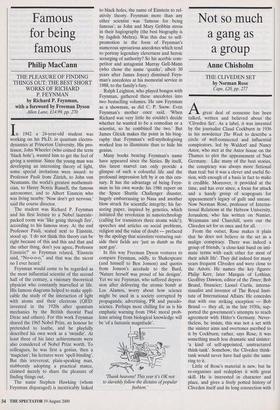Famous for being famous
Philip MacCann
THE PLEASURE OF FINDING THINGS OUT: THE BEST SHORT WORKS OF RICHARD P. FEYNMAN by Richard P. Feynman, with a foreword by Freeman Dyson Allen Lane, £14.99, pp. 270 In 1942 a 24-year-old student was working on his Ph.D. in quantum electro- dynamics at Princeton University. His pro- fessor, John Wheeler (who coined the term `black hole'), wanted him to get the feel of giving a seminar. Since the young man was developing an interesting theory of light, some special invitations were issued: to Professor Pauli from Ziirich, to John von Neumann, the world's greatest mathemati- cian, to Henry Norris Russell, the famous astronomer, and to Albert Einstein who was living nearby. 'Now don't get nervous,' said the course director.
The student was Richard P. Feynman and his first lecture to a Nobel laureate- packed room was 'like going through fire', according to his famous story. At the end Professor Pauli, seated next to Einstein, stood up. 'I do not think this theory can be right because of this and this and that and the other thing, don't you agree, Professor Einstein?' so Feynman related. 'Einstein said, "No-o-o-o," and that was the nicest no I ever heard.'
Feynman would come to be regarded as the most influential scientist of the second half of the century, a visionary theoretical physicist who constantly marvelled at life. His famous diagrams helped to make appli- cable the study of the interaction of light with atoms and their electrons (QED: invented in the 1920s after quantum mechanics by the British theorist Paul Dirac and others). For this work Feynman shared the 1965 Nobel Prize, an honour he pretended to loathe, and he playfully described his own work as a 'swindle'. At least three of his later achievements were also considered of Nobel Prize worth. To colleagues, he was first a genius, then a `magician% his lectures were 'spell-binding'. But this irreverent, plain-speaking man, stubbornly adopting a practical stance, claimed merely to share the pleasure of finding things out.
The name Stephen Hawking (whom Feynman disparaged) is inextricably linked to black holes, the name of Einstein to rel- ativity theory. Feynman more than any other scientist was 'famous for being famous', as John and Mary Gribbin stress in their hagiography (the best biography is by Jagdish Mehra). Was this due to self- promotion in the form of Feynman's numerous uproarious anecdotes which tend to portray legendary cleverness and heroic scourging of authority? So his acerbic com- petitor and antagonist Murray Gell-Mann (who chose the name 'quarks', albeit 30 years after James Joyce) dismissed Feyn- man's anecdotes at his memorial service in 1988, to the family's fury.
Ralph Leighton, who played bongos with Feynman, gathered these anecdotes into two bestselling volumes. He saw Feynman as a showman, as did C. P. Snow. Even Feynman's mother once said, 'When Richard was very little he couldn't decide whether he wanted to be a comedian or a scientist, so he combined the two.' But James Gleick makes the point in his biog- raphy that Feynman's self-mythologising worked less to illuminate than to hide his genius.
Many books bearing Feynman's name have appeared since the Sixties. By itself, this latest marvel can only provide a glimpse of such a colourful life and the profound impression left by it on this cen- tury. It has the advantage of being Feyn- man in his own words: his 1986 report on the Space Shuttle Challenger disaster, hugely embarrassing to Nasa and another blow struck for scientific integrity; his far- seeing paper, inspired by genetics, which initiated the revolution in nanotechnology (calling for transistors three atoms wide!); speeches and articles on social problems, religion and the value of doubt — prefaced by the apology that scientists venturing out- side their fields are 'just as dumb as the next guy'.
In this way Freeman Dyson ventures to compare Feynman, oddly, to Shakespeare (and himself to Ben Jonson) and quotes from Jonson's accolade to the Bard, `Nature herself was proud of his designs'. Yet we see Feynman, who suffered depres- sion after delivering the atomic bomb at Los Alamos, worry about how science might be used in a society corrupted by propaganda, advertising, PR and pseudo- science. Perhaps most chilling for us is his emphatic warning from 1964: moral prob- lems arising from biological knowledge will be 'of a fantastic magnitude'.
`Thank heavens! This year it's OK not to slavishly follow the dictates of popular fashion.'


























































 Previous page
Previous page